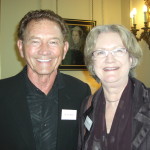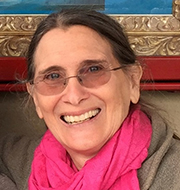With 2021 drawing to a close, I’ve been reflecting on the “new normal” (or not normal) wrought by the pandemic, climate change and growing inequity worldwide. Despite these crazy times, Jerry and I have continued to promote social causes in the long relay race for a safer, more just and peaceful world, understanding that all of us are inextricably interconnected, so we have a sacred obligation to bring love, hope and peace to everyone everywhere. The work never stops. So, when the temperature drops and sunlight wanes, we can all take heart in knowing that every culture celebrates the power of light over darkness near the winter solstice. As the Brits say, we have to calm down and carry on.... more
Philanthropy

beCause CEO Nadine Hack’s opening keynote at Stockholm Philanthropy Symposium – Other speakers will address with great wisdom myriad specifics on philanthropy, impact investing, corporate responsibility, social innovations, digital platforms, partnerships, gender equity and more. So, to start, I’ll share a meta framework about what I call connectedness because I believe it’s at the core of all those topics and, actually, everything. You can watch video of presentation. First, please turn to someone near who you don’t already know and introduce yourselves. Take a minute max each so the two introductions will take two minutes max. Go ahead! [participants interact] How many of you basically shared your name, where you’re from and what you do? That’s kind of like the... more

By beCause Associate Ravi Chaudhry — Business has been the most powerful institution on the planet since the second half of the twentieth century. Dr Willis Harman, co-founder of the World Business Academy in 1987 put forward the view that the dominant institution in any society needs to take responsibility for the whole, as the church did in the days of the Holy Roman Empire. Built into the original concept of capitalism and free enterprise was the assumption that the actions of many individual enterprises, responding to the market forces and guided by the ‘invisible hand’ of Adam Smith, would somehow add up to desirable outcomes. But it is amply clear that the ‘invisible hand’ is faltering. It depended on a... more

I am honored to have Tech-Geekista Nikki Longo write the following guest post on power of social media: “In an eye-opening experiment conducted earlier this year, Facebook encouraged its users to become organ donors. The response was nothing short of a miracle, as organ donor registration increased by 3,012 donors on the first day of the campaign. That uptick accounted for a 2000% increase in daily donor registrations. Today, charitable organizations often use crowdsourcing via social networks like Kickstarter to fund their initiatives. Crowdsourcing in its most basic sense is receiving services, ideas, financial donations, or content by seeking contributions from a large group of people. In recent years, social media has helped nonprofit organizations find that delicate balance of asking... more
Graham Bowley’s pieces in The New York Times “Bailout Helps Fuel New Era Wall Street Wealth” and “Bonuses Put Goldman in Public Relations Bind” and The Financial Times editorial “Public Needs More Bang for Its Buck” are among a rash of recent articles describing a disparity that virtually everyone is experiencing. I find great cause for concern about the trend these pieces expose, as history shows that depriving many people of even the fundamental basics while a select few benefit astronomically never is sustainable. Frank Rich’s earlier op-ed “The Rabbit Ragu Democrats” highlights how the main relationships businesses currently cultivate are with lobbyists who can press their pet concerns with government officials. His is a cautionary tale of the adverse affects... more

I’d worked with diplomats and women’s rights activists from several nations to promote the passage in 2000 of 1325, a UN Security Council Resolution that mandates the protection, participation and promotion of women and their involvement in all aspects of peace processes. Last week, during the opening of 64th UN General Assembly, I attended “Peace and Security through Women’s Leadership: Acting on 1325 and Climate Change” chaired by Presidents Ellen Johnson Sirleaf of Liberia and Tarja Halonen of Finland. They once again declared a call to action for implementation of 1325 before its 10th anniversary next year. They also focused on the incorporation of a gender perspective to be included in the negotiations for a new agreement on climate change. This meeting was a follow up... more
Women and girls are the key to sustainable development and have the capacity to resolve myriad crisis that plague our world. I applaud the many insightful articles in today’s The New York Times Magazine with the cover “Why Women’s Rights Are the Cause of Our Time” (emphasis my own). I have been an advocate of the perspective highlighted in these pieces and I encourage you to read all of them. As Nicholas Kristof and Sheryl WuDunn wrote in their 21st century manifesto, there is growing recognition among leaders from all sectors – public and private – that supporting women and girls throughout the world is the solution for many of the world’s problems. As Mark Landler wrote in his piece... more
Akash Kapur’s New York Times article describes through his personal experiential lens, “creative destruction,” a concept Joseph Alois Schumpeter popularized in his 1942 book Capitalism, Socialism and Democracy. Kapur describes how innovative entrepreneurial development that can sustain long-term economic growth bringing wealth to some in previously impoverished areas, simultaneously often destroys the values of a culture, fabric of a community and the natural beauty of an environment. The July 2009 issue of the Chicago Journals Economic Development and Cultural Change’s articles address this phenomenon from different perspectives in various countries’ initiatives. Since I’ve long supported sustainable development initiatives in the US and throughout the world, I continue to explore with all types of leaders – from local communities to national governments... more

The speakers at 10 Downing Street included our host Sarah Brown, Archbishop Desmond Tutu, Anne Aslett of the Elton John AIDS Foundation and Dillon Woods of the Donald Woods Foundation (DWF) who each explained why they support the comprehensive services provided by DWF, all created with shared ownership by the residents in the Mbashe area of South Africa’s Eastern Cape. They believe as I do that only through an engaged, empowered multi-faceted approach do local communities achieve self-sustainability. I have learned over decades of work that whether you are a business, an NGO or a government when you follow the guidance of local leadership, help strengthen local capacity and collaboratively address problems from multiple angles, you can create sustainable success. DWF does exactly this... more
My husband Jerry Dunfey and I are going to 10 Downing Street tonight for an event Sarah Brown is hosting for the Donald Woods Foundation, a philanthropic development organization. Woods was a very close friend of ours and had to escape from apartheid South Africa after he broke the story of Steve Biko’s murder. Jerry is a Founding Patron of the foundation with Wendy Woods and Ntsiki Biko, respectively the widows of Donald Woods and Steve Biko. Desmond Tutu, who married us, will be the other special guest at 10 Downing St. To get into the spirit of the connections between the British anti-apartheid movement and the struggle within South Africa, we stopped at the statue of Nelson Mandela that was... more


